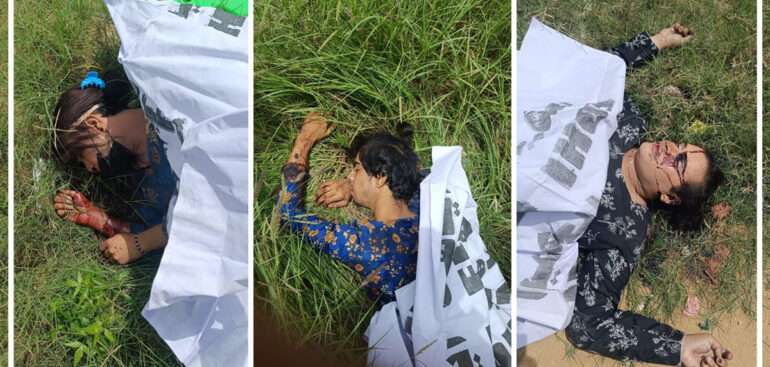In the early hours of Sunday, the silence of Memon Goth, Karachi, was violently broken when the lifeless bodies of three transgender individuals were discovered, shot mercilessly in cold blood. The bodies, marked by bullet wounds, were swiftly taken to the Jinnah Postgraduate Medical Centre, where the painful reality of this heinous act became undeniable.
The police have confirmed the tragic loss, with Javed Ahmed Abro, a city police official, stating that the identities of the victims were still under investigation. However, no amount of investigation could erase the gut-wrenching pain that this senseless killing has caused, not only to the victims’ families but to an entire community already living in constant fear.
SSP Malir, Dr. Abdul Khaliq Pirzada, rushed to the scene and vowed to leave no stone unturned in the investigation. Special police teams were deployed with clear instructions to track down the perpetrators. In a rare moment of swift response, Sindh’s Chief Minister, Syed Murad Ali Shah, condemned the killings and ordered the immediate arrest of those responsible, stressing that transgender individuals, some of the most marginalized in society, deserve protection and respect. His words echoed a truth that remains painfully ignored: “The state will not tolerate the killing of any oppressed and innocent citizen.”
Yet, as the state rallies to take action, the emotional devastation lingers—undeniable, deep-rooted, and all-encompassing. This is not an isolated incident. The rising tide of violence against transgender individuals in Pakistan is a clear indicator of the failure of a system that continues to neglect and dehumanize them. Human rights organizations like Amnesty International have repeatedly highlighted how these crimes are underreported, swept under the rug, and left to fester in the shadows of society. Shahzadi Rai, a tireless advocate for transgender rights, aptly pointed out, “When hate speech and campaigns are carried out so openly, outcomes like this are inevitable.” The hatred is not only condoned, it is nurtured.
The cold-blooded murder of these three transgender individuals serves as a painful reminder of the long road ahead—one that has yet to lead to true equality and acceptance. Despite the government’s efforts and the work of human rights groups, the transgender community in Pakistan remains deeply vulnerable, subjected to exclusion, violence, and systemic discrimination. A report by Blue Veins and the National Commission on Human Rights has shed light on the grim reality they face—denied employment, rejected by their families, and often left to fend for themselves in a world that refuses to see their humanity.
This latest tragedy in Karachi is not the first of its kind. Earlier this year, a transgender individual was murdered in Khyber Pakhtunkhwa, and just a few months ago, another senseless killing occurred in Peshawar. Last year, two transgender people were brutally stabbed to death in Mardan; their killers were never apprehended. These are not isolated incidents but part of a terrifying, ongoing trend—one that shows no signs of stopping.
These killings are not merely the result of a few bad actors—they are the outcome of a society that has failed its most vulnerable citizens. They are a manifestation of a deep-seated, pervasive injustice that persists because of collective indifference.
The question that remains is not just one of justice for the victims, but of accountability for a system that has, time and time again, turned a blind eye to the suffering of transgender people. It’s not enough to condemn these acts after the fact; the state must take concrete, lasting action to ensure the safety and dignity of the transgender community. This includes not only investigating crimes but dismantling the structures of hate and discrimination that enable such violence to thrive.
In the face of this injustice, the real question is: who will stand for those who have been silenced by hate? The answer must come from all of us. We must demonstrate the same urgency in protecting these lives as we do in seeking justice for their killers. Only then can we begin to break the cycle of violence that has haunted the transgender community for far too long. Until we do, we will continue to live in a society where the most vulnerable are left to die without even a whisper of justice.
